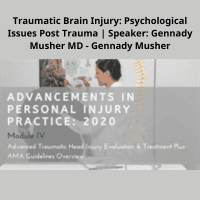Course Summary:
This course, led by Gennady Musher MD, focuses on the significant psychological issues that individuals often experience after sustaining a Traumatic Brain Injury (TBI). It provides a detailed understanding of the various mental health challenges that can arise in the post-trauma period, impacting recovery and overall well-being. Dr. Musher draws upon his expertise to explain the neurological underpinnings of these psychological changes and offers insights into assessment, management, and support strategies. The course aims to equip learners with a comprehensive understanding of the psychological sequelae of TBI to better support individuals on their recovery journey.
Target Audience:
This program is ideal for:
- Healthcare professionals (doctors, nurses, physician assistants)
- Mental health professionals (psychologists, therapists, counselors)
- Rehabilitation specialists (occupational therapists, physical therapists, speech-language pathologists)
- Social workers and case managers
- Caregivers and family members of individuals with TBI
- Students and researchers in neuroscience, psychology, and rehabilitation fields
- Anyone seeking to understand the psychological impact of Traumatic Brain Injury.
Main Content:
The course likely covers key areas such as:
- Introduction to Traumatic Brain Injury: An overview of TBI, its causes, and its neurological effects.
- Common Psychological Issues Post-TBI: Detailed exploration of conditions such as:
- Depression and anxiety
- Post-Traumatic Stress Disorder (PTSD)
- Irritability and aggression
- Changes in personality and behavior
- Sleep disturbances
- Cognitive impairments and their psychological impact
- Neurobiological Correlates: Understanding the relationship between brain injury and psychological symptoms.
- Assessment and Diagnosis: Methods for identifying and diagnosing psychological issues in individuals with TBI.
- Management and Treatment Strategies: Overview of various therapeutic approaches, including:
- Psychotherapy
- Pharmacological interventions
- Neurorehabilitation strategies
- Support and Coping Mechanisms: Strategies for individuals with TBI, their families, and caregivers.
- Long-Term Psychological Outcomes: Understanding the potential long-term psychological challenges and recovery trajectories.
Learn crucial insights into the psychological effects of TBI.
SIGN UP NOW







